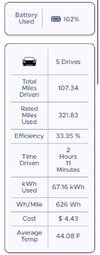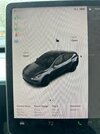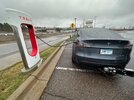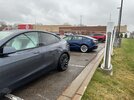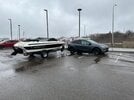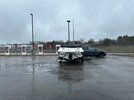One of my big motivations for switching to the Model Y from my EV6 was the ability to tow my boat. I have a 2011 Larson LX850 that I bought new, and I’ve towed it with about a dozen different vehicles over the years I’ve had it. It weighs between 3,400-3,500 lbs depending on gear and fuel, so it’s at the upper end of the Y’s capacity. For the last four years, I’ve kept an old 2004 Expedition in the garage to tow with, and today was my first experience towing with my new Model Y.
The boat had to come out of storage today, so my inaugural tow was an 45-mile trip home in 43º F weather. All I can say is, “wow.” Handling was rock-solid, and it felt more comfortable to drive than anything else I’ve pulled with. Better than the F150s, minivans, SUVs, and my old Expedition did with it. As expected, I had gobs of power at all speeds and it was too easy to go a lot faster than needed while keeping up with rush hour traffic. My trailer has well-functioning surge brakes, and the regenerative braking was strong enough to rarely use the brake pedal. I had to stop fast from 70 MPH for a traffic light and the car handled it great.
My overall efficiency was 595 wh/mi. That included a fair amount of stop-and-go for the first fifteen miles, but the last 30 were mostly cruising at 68 MPH. My 30-mile average for the higher-speed portion was over 600 wh/mi, so I’ll have to watch my speed over the 120-mile trip to the boat ramp and back.
The Model Y feels great with a trailer. I’ll update this thread with more efficiency numbers and thoughts as I put on some more miles this summer, but I’m very impressed with how it did this time.



The boat had to come out of storage today, so my inaugural tow was an 45-mile trip home in 43º F weather. All I can say is, “wow.” Handling was rock-solid, and it felt more comfortable to drive than anything else I’ve pulled with. Better than the F150s, minivans, SUVs, and my old Expedition did with it. As expected, I had gobs of power at all speeds and it was too easy to go a lot faster than needed while keeping up with rush hour traffic. My trailer has well-functioning surge brakes, and the regenerative braking was strong enough to rarely use the brake pedal. I had to stop fast from 70 MPH for a traffic light and the car handled it great.
My overall efficiency was 595 wh/mi. That included a fair amount of stop-and-go for the first fifteen miles, but the last 30 were mostly cruising at 68 MPH. My 30-mile average for the higher-speed portion was over 600 wh/mi, so I’ll have to watch my speed over the 120-mile trip to the boat ramp and back.
The Model Y feels great with a trailer. I’ll update this thread with more efficiency numbers and thoughts as I put on some more miles this summer, but I’m very impressed with how it did this time.



